QuestionQUESTION: About a year ago my husband and I adopted our shepherd lab mix, jack from a local no kill shelter. We were told that he was picked up on the streets by animal control and brought to them, he was 3 months old when we adopted him. We tried for over a month to crate train him but he just absolutely hated it. After destroying one metal crate and injuring himself we got him the plastic kennel; he still hated it but was unable to escape....for a few weeks until he managed to chew a hole big enough to slip out of. After this we decided not to get another crate. Also, he would urinate every time we put him in the crate, despite several trips outside before being left in the crate. We also tried just putting him in our office with our other dog ranger; jack tore up the carpeting all the way to the bare wood and scratched the door and door frame badly. And again he would urinate and defecate in that room if left more than 10 minutes alone. Now, we leave the two dogs in the living room and kitchen and close all the other doors so they cannot get in to any rooms. Jack urinates and defecated every time we leave. He is over a year old now and it is becoming very frustrating. We decided to try leaving him with my parents and their dogs for a few weeks and he had no accidents at all while he was there. When we returned home, my husband and I left for about an hour and came back to find jack had defecated in the living room (we had taken him out before we left and he did all of his pottying). We just don't know what else to try!! I scold him every time I come home and see that he has gone in the house but I don't hit him. I feel bad because he doesn't ever do it in front of us or if were home at all, only when we are gone, so I'm not sure if he is understanding why I'm scolding him. Please help us!!!! My husband has talked about getting rid of him and I just refuse to give up on him! I would be so grateful if you could help me figure this out!!!
ANSWER: Hi Jenny:
First never scold a dog for going potty in the in-correct place. Scolding dogs for going potty in inappropriate places only teaches them you don't like it when they go potty not you do not like where they are going.
"I feel bad because he doesn't ever do it in front of us or if were home at all, only when we are gone"
What you are describing sounds more like separation anxiety than a toilet training issue.
The points you make:-
"only when we are gone"
We tried for over a month to crate train him but he just absolutely hated it. After destroying one metal crate and injuring himself we got him the plastic kennel; he still hated it but was unable to escape....for a few weeks until he managed to chew a hole big enough to slip out of. After this we decided not to get another crate. Also, he would urinate every time we put him in the crate.jack tore up the carpeting all the way to the bare wood and scratched the door and door frame badly.
In this line you say "We decided to try leaving him with my parents and their dogs for a few weeks and he had no accidents at all while he was there."
Where your parents home with him all the time?
Or
What is the main difference between your parents home and yours. Location, Traffic Noise, amount of people traveling by.
True separation Anxiety is rare, but is found most commonly in abandoned dogs.
Most separation Anxiety is based on lack of training and the building of a leadership role. We as humans tend to over compensate for a dogs past and thereby are a little softer and/or do not set up the roles of leadership well enough, so that the dog feels he/she is pack leader and then stresses when the rest of the pack leaves without them.
As you do not mention any training or any work you have done on leadership skills, socialization etc, I cannot say weather you are dealing with True Separation Anxiety or lack of Leadership skills and training.
There are several remedies available for separation anxiety, such as pheromone collars, plug in dispensers. There are also herbal remedies, that come in both Pill and drop formulas.
Also vets can prescribe prescription medications for anxiety control.
Lack of sufficient exercise, Structured walks, structured play, agility or some other activity will often cause issues. A large yard or companion dog are not always sufficient for high energy dogs.
Both Labs and Shepherds' are high energy dogs and need constant structured environments and structured play.
There is also a concern about the stability of German Shepherds, with so much interbreeding we are seeing many Shepherds with anxiety and fearfulness, that is almost impossible to work with as this is an inheritable condition (Bad Breeding Practices).
I would need a lot more detail on Jack's life circumstances, training and general behavior to be more direct with my advise.
If you can provide me with more information, I may be able to assist you further.
Regards
Marcia Murray-Stoof C.P.D.T.
---------- FOLLOW-UP ----------
QUESTION: Hi, first I'd like to thank you for your advice you have given me. I apologize for leaving out some details before. I find it very interesting and it makes a lot of sense when you said not to scold Jack for pottying in the incorrect place since he does not understand that is why I'm scolding him. Do you have any tips for what I should do if he does go in the house? Normally I tell him he is a bad boy and that he knows better and pick it up and flush it down the toilet or clean it up with a rag, whatever the case may be. I understand now not to scold him, but I've heard that picking it up in front of them can tell them its ok to go in the house that I will just clean it up for him, is this true? Also, most dogs don't potty in the crate if at all possible since it is their "den" or "safe place" but like I said Jack would pee in there every time. My belief is that it is because at the place where we adopted him from the dogs are kept in crates, and maybe he wasn't let out enough or something (just a thought). Anyways, back on topic, there a several differences between my place and my parents: We live in an apartment with our one other dog, and normally my husband and I are gone until 4 or 5 PM. Of course I feel bad leaving them that long during the day, but even if we only leave for 10 minutes Jack still goes in the house. My parents live in a house with a fenced in backyard and have two dogs as well. All the dogs get along great and enjoy playing with each other. My mom is usually home with them, but would leave for a few hours at a time, if I were to guess probably about 2 to 5 hours at a time. I think those are the main differences between our two homes.
I have thought that this was separation anxiety as well, but I'm just not sure if it is or not. Our dogs do get walked, but like most dog owners, I know we don't walk them nearly enough. They do have somewhat of a structured day though; we wake up, take a walk, they are fed, take another walk mid to late day and are fed again (dinner) and usually walked once again before bed. It is interesting though that you bring up fearfulness because Jack, and our other dog Ranger actually, are very fearful of people they don't know. They bark and try to hide (more Ranger than Jack) if people come over, but outside Jack is worse than Ranger about people and other dogs he sees (he barks and pulls relentlessly but is very scared if they come up to him).
I can also see your point about leadership though. I'm not sure if our dogs understand that we are the "pack leaders" or not. They mind pretty well and are very intelligent. What can we do to make sure that the dogs know we are the pack leaders not them? I'm sure that's not an simple question to answer, but no matter how much dog whisperer I watch I still don't get it.
Well anyways thank you again for your advice so far and I hope I have given you some more information that you needed. I really appreciate it!
Jenny
AnswerHi Jenny:
Do you have any tips for what I should do if he does go in the house?
Make sure you are using a Pet Stain & Odor remover, as you need to remove the scent dogs can detect. For Pee's I say leave it on the area for at least an hour before cleaning it up. AS Pee soaks down to the backing, and you need the cleaner to soak in that far as well.
There is no research or data to back up the idea that them seeing you clean up their messes, encourages to them to continue to mess. However, over 25 years I have seen some clients remove to dog from the area, before cleaning it up and the training has advanced from then on. Now this may be just finally establishing consistency or the dog finally got it or it may not. But at this stage I would say anything is worth a try.
AS regards to the soiling in the create, once a dog has been forced to break that cardinal dog rule, it's broken for good. Yes, being left in a create beyond the amount of time we can expect them to hold it, will cause them to eventually go in the create, though this is against their nature.
On the possible separation anxiety:-
You mention both your dogs are fearful at some level (are your Mum's dogs well adjusted# this could be why Jack was OK there.
Also an apartment has lots of other noise, that can seem to come from with-in the apartment, where as a house with a yard has different noise levels.
Is there a chance that on coming to your home, there was some noise, hallway commotion, Loud neighbour, and in his fearful state he now fears being left alone in the apartment after the the first few times and now it has become a pattern.
On Leadership Skills:-
Dogs communicate by Scent, Body Language and then sound.
Scent yours you should always try and remain clam.
Body Language, also stand up straight, if you need to get lower, kneel down and keep your back straight #Tall-upright means Large and In charge / Bending means - unsure, afraid#
Sound:- Tone of voice - High Squeaky is a praise play tone #our soothing voice, is interpreted as a reward tone, so when a dogs is acting fearful and we use that soft sweet claming voice we are actually praising the fearful behaviour. Deep and Low tone is a warning or correction tone.
Also with voice do not repeat commands, as we start to change the tone and if the dogs has not complied we start to get frustrated and change our scent.
Once we are 100% sure a dog knows the command, we would issue it once, then gently and calmly place the dog in the required position. IE: Leadership, I mean what I say, and you are expected to follow through without question.
The key point in Leadership is that you Lead, IE: you always go first. First out the door, First in the door, You eat first, you get into bed first or on the couch Etc.
Spending at least 30 minutes a day (can be done in 3 10 minutes sessions), working on commands such as Sit, Down, Come, Stay, Wait, Drop it, Leave It. Also teaching tricks is obedience work, so throw some trick training in there.
Walking- at minimum an hour a day. Dog must walk beside you, no flexi leads/leashes. A walk as a pack is a job, not a time for the dog to go explore and take potty breaks. If you need to let your dog go potty on a walk, pick a spot and stop and allow time to sniff around to go potty, then once done, continue in a leadership/pack walk. You decide the pace and direction. never the dog.
All this will take time and not be an instant fix. with structure, and training things should slowly improve.
If possible try Doggie daycare, or arrange for a dog walker for those hours that you are away.
I always say dogs can not be left on a regular basis for more than 4 hours. A trip home during Lunch will help, if possible or a neighbour dropping by for am hour with the dogs. Dogs are pack animals so without us their human pack around, some dogs just do not do well. Fearful dogs lack the compensation skills confident dogs do for long time lines without their owners or other humans around for structure.
I am going to suggest you find a local canine behaviourist and/or certified Professional trainer, to work closely with you. You will look for someone, that when you tell them the problems they ask you lots of questions and ask to see the dog. This will tell you they have the knowledge and possible skill set to assist you. Regards

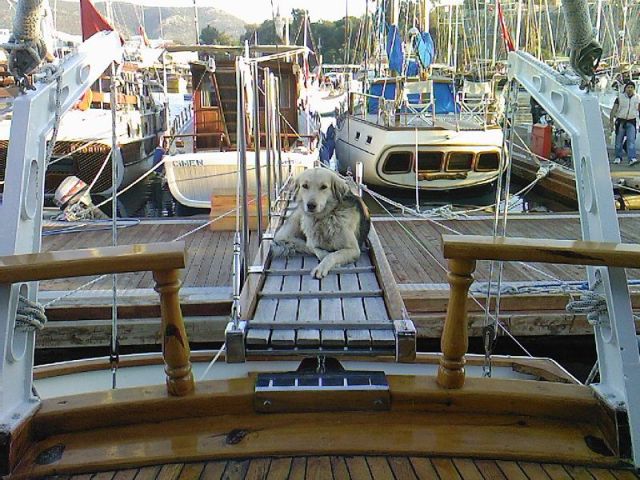 breed identification
QuestionMaggie
QUESTION: Hello - Ive hopped over
breed identification
QuestionMaggie
QUESTION: Hello - Ive hopped over
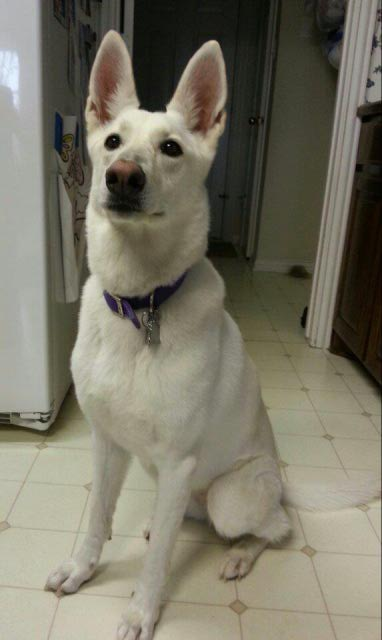 White German Shepherd Aggression
Question
Chloe
A little background on my dog Chl
White German Shepherd Aggression
Question
Chloe
A little background on my dog Chl
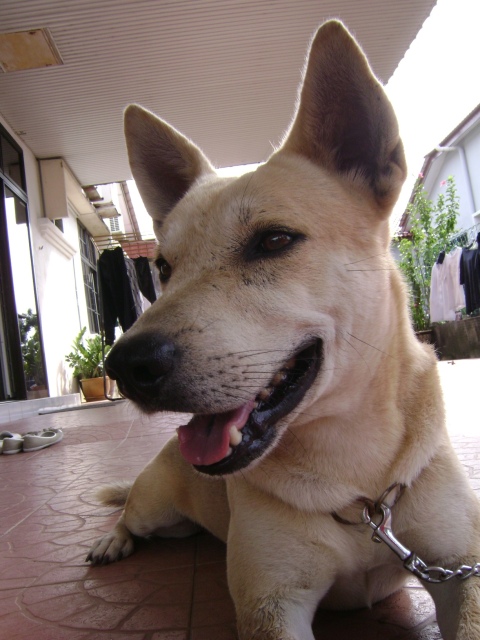 how to train a dog?
Questiondog
QUESTION: hi,I want to ask you,how t
how to train a dog?
Questiondog
QUESTION: hi,I want to ask you,how t
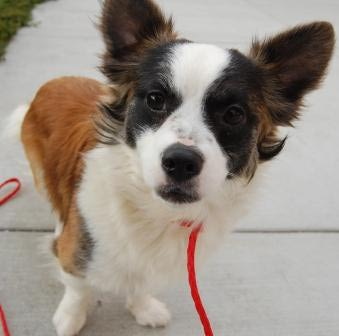 How do you feel about citronella collars?
QuestionPanda
QUESTION: I have a male Corgi mix,
How do you feel about citronella collars?
QuestionPanda
QUESTION: I have a male Corgi mix,
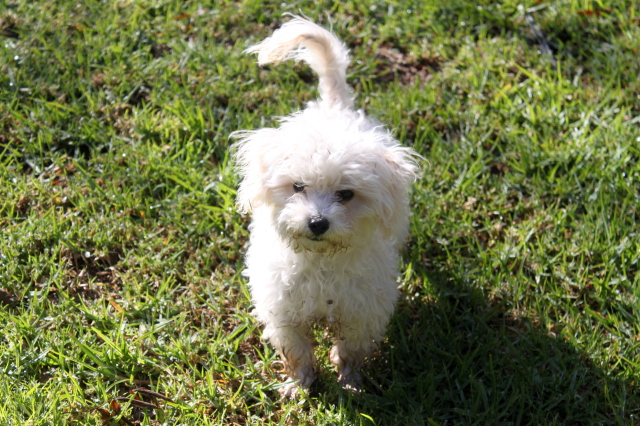 Young Moodle Trouble
Question
Moodle, male, 10 - 11
I have a two question.
Young Moodle Trouble
Question
Moodle, male, 10 - 11
I have a two question.